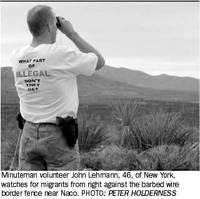A New Way To Patrol The Texas Border: Virtually
February 23, 2009
In a controversial program aimed at enhancing border security, Texas sheriffs have erected a series of surveillance cameras along the Rio Grande and connected them to the Internet.
Written by John Burnett, NPR

Click here to listen to the radio version of this report.
All Things Considered, February 23, 2009 · In a controversial program aimed at enhancing border security, Texas sheriffs have erected a series of surveillance cameras along the Rio Grande and connected them to the Internet.
Thousands of people are now virtual Border Patrol agents — and they're on the lookout for drug smugglers and illegal immigrants.
Robert Fahrenkamp, a truck driver in South Texas, is one of them.
After a long haul behind the wheel of a Peterbilt tractor-trailer, he comes home, sets his 6-foot-6-inch, 250-pound frame in front of his computer, pops a Red Bull, turns on some Black Sabbath or Steppenwolf, logs in to www.blueservo.net — and starts protecting his country.
"This gives me a little edge feeling," Fahrenkamp says, "like I'm doing something for law enforcement as well as for our own country."
How It Works
Online border patrolling is about as sexy as real-life police work — hours of tedium punctuated by minutes of high excitement.
On Blueservo's Web site, each camera focuses on an area that's known for illegal crossing. Next to a real-time view of a grassy meadow is the message: "Look for individuals on foot carrying backpacks." A shot of a border highway says, "If you see movement from the right to the left, please report this activity."
When a citizen spots suspicious activity, they click a button on the Web site and write a report. That message goes to the corresponding sheriff's office. The sheriff may handle the problem or call the U.S. Border Patrol.
To date, more than 43,000 people have logged on and become, as the Web site calls them, "virtual Texas deputies."
Donald Reay, executive director of the Texas Border Sheriff's Coalition, says most of the virtual deputies are in Texas, though some are as far away as Australia.
"They said in good Australian fashion, 'Hey, mate, we've been watching your border for you from the pub in Australia,'" Reay recalls.
Since the program started in November, virtual deputies have yielded four marijuana busts, totaling more than 1,500 pounds, and 30 incidents when illegal crossers were repelled.
Political Opposition
The Texas governor's criminal justice office funds the program, and it will spend $2 million in its first year.
But there is political opposition, including from state Sen. Elliot Shapleigh (D-El Paso), who calls it a "waste of money." He says border protection should be left to the government. The border cameras "invite extremists to participate in virtual immigrant hunts," he says.
Bob Parker, another online border watcher, doesn't buy that assessment.
"If they want to call that being a vigilante for reporting people illegally crossing the border, then so be it," Parker says.
Officially, the U.S. Border Patrol has no comment about the placement of surveillance cameras on private property along the international river. Privately, an unnamed veteran agent in South Texas said he's dubious of the program.
But effective or not, more than 43,000 pairs of eyes are watching the Texas-Mexico border through blueservo.net.
![]()
![]()
Related Stories
![]()
Fair Use Notice
This site contains copyrighted material the use of which has not always been specifically authorized by the copyright owner. We are making such material available in our efforts to advance understanding of environmental, political, human rights, economic, democracy, scientific, and social justice issues, etc. We believe this constitutes a "fair use" of any such copyrighted material as provided for in section 107 of the US Copyright Law. In accordance with Title 17 U.S.C. Section 107, the material on this site is distributed without profit to those who have expressed a prior interest in receiving the included information for research and educational purposes. For more information go to: http://www.law.cornell.edu/uscode/17/107.shtml. If you wish to use copyrighted material from this site for purposes of your own that go beyond "fair use", you must obtain permission from the copyright owner.